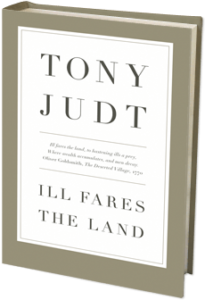 The fine cultural historian, Tony Judt, last year dictated a book as he was dying of Lou Gehrig’s disease. This book is called, Ill Fares the Land, from a 1770 quote from Oliver Goldsmith: “Ill fares the land, to hastening ills a prey, where wealth accumulates, and men decay.” In looking at the legacy of the 1960’s, Judt claims that the yearning for justice became transformed into a yearning for liberation. He sees this as a failing of the New Left that moved away from the Old Left’s sense of group and class needs. Why was this bad? Because the celebration of personal freedom meant losing visions of communal struggle and public purpose, as well as good traditional values of sharing for the common good, of sacrificing for a better future.
The fine cultural historian, Tony Judt, last year dictated a book as he was dying of Lou Gehrig’s disease. This book is called, Ill Fares the Land, from a 1770 quote from Oliver Goldsmith: “Ill fares the land, to hastening ills a prey, where wealth accumulates, and men decay.” In looking at the legacy of the 1960’s, Judt claims that the yearning for justice became transformed into a yearning for liberation. He sees this as a failing of the New Left that moved away from the Old Left’s sense of group and class needs. Why was this bad? Because the celebration of personal freedom meant losing visions of communal struggle and public purpose, as well as good traditional values of sharing for the common good, of sacrificing for a better future.
Tony Judt, then, knew that toxic inequality was choking our country well before Occupy Wall Street, and he calls eloquently for a renewal of moral, communal purpose beyond the nihilistic individualism that tries to make the market the model for human society. But Judt, like a good contemporary European or American intellectual, has no place for faith. For him, religious language is what conservative elites use to cloak authoritarian grabs for power and wealth. For me, this loss of faith and hope adds to the elegiac, mourning quality in Judt’s book.
But Patrick, as a scribe of the kingdom, as a Christian of trained intellect, you know how our faith unites both the gift of individual freedom and fulfillment—found in our unique callings, and our great solidarity in the body of Christ. For us, the values of personal love and social justice have a transcendent source, the same source, the same redemptive energy that enlivens both our hearts and our communities.
As for cloaking authoritarianism, our Presbyterian tradition is anti-authoritarian. It is conciliar, it has the solidarity of equality and representation, as we believe in mutual accountability and democratic discernment. Our cyber journal is to serve those goals. For us, faith is precisely to uncloak even spiritual power grabs. Authorities are for questioning; but authority is be shared, not denied. Actually, power is up-ended by Jesus’ announcement: I am among you as one who serves. The first shall be last on the cross and first from the tomb.
The profound but secular worldview of Tony Judt has much in common with the prophetic and wisdom literature in our scripture. It is finally among the old treasure for us, among the gifts of culture that shape us but cannot define us. They are not all tares, in fact they are treasures from an old order. Christ remains, ever and always, our new and renewing Being. “Late have I loved Thee, Beauty so ancient yet so new,” says Augustine, one of our great scribes of the Kingdom.
So quickly now, how do we balance the new and the old, the toleration and even use of tradition and culture, and the judgment that the old order is and should be passing away?
First, we acknowledge that the church has found it hard to balance how much new and how much old to take from the treasure that God gives us. When the culture went big into personal freedom (the expressive individualism analyzed so well in Habits of the Heart), the church fought over power and authority. Cultural trends damaged politics in the society, but politics damaged some of the internal culture of the church.
The weakening of the church also hurt our witness. This is part of why our culture lost healthy ways of speaking about our country, our government, and our families; patriotism became nationalism, our government became more an empire, and our families were fed into the marketplace. Reactionaries responded to the loss of real values, though they often embraced the very forces destroying the family, corrupting our governance, and degrading our nation’s standing in the world. In a time of change, they tilted backward, choosing more of what they thought were old treasures but which were too much of the old order, the husk, not the ear, of the harvest.
Judt is right, then, in warning us not to lose our connection to the family, the country, our traditions, even as we are called to reform them. And here again, I think you get some of this. We are Eagle Scouts, which means that we were un-cool, but we learned to march and do “manly” things in the woods, to learn self-reliance when camping, etc. This is to say, we know this is our country and its traditions are our traditions, and when we challenge them, we come from the place of love and knowledge. We know that America is not a marketplace because it is our household, and we know the place of our church to care for and challenge it.
Ironically, the mainline church became less of a public church as we helped countless families struggle honestly through divorce and other painful realities of a changing world. Let me insist that we did not go entirely private. Even after the great days of civil rights and helping to end the Vietnam war, we mainliners started raising the ecological concerns, we affirmed liberation movements in South Africa and Central America, we influenced much of the corporate social responsibility movement, we continued to struggle against racism, we welcomed—haltingly but unmistakably—the gifts of women.
And we have led much of the culture in struggling over gay rights and understanding, though we were not at the front of that struggle. Even now, as we face the loss of a number of conservative congregations who cannot accept inclusive ordination, it is not a question that the church should be about justice as well as love. Even some of our most conservative friends are willing, for example, to stand up for the rights of Palestinians, and to be in solidarity with Palestinian Christians.
How much to mix old and new is partly an educational question, a matter of wisdom and interpretation. You will not get it all overnight. But part of the decision to tilt toward the new is the call of conscience to solidarity. The new seems “new” sometimes because the tares choked our memory as they choke our action. Sin is part of the power that rules through amnesia, so we turn part of our hope backwards to learn from the good struggles, and then also to uproot the most pernicious falsehoods. Not all tares are toxic, but your job is to help make sure the church can continue to distinguish the wheat and the tares. May that purpose guide your editing, your interpreting, your own voice and vision for the common good. May we all tilt forward toward that reign of heaven that we have glimpsed on earth.
Amen.
The Rev. Christian Iosso, Ph.D., is the Senior Editor of Unbound and Coordinator of the Advisory Committee on Social Witness Policy. The Rev. Patrick David Heery, M. Div., is the Managing Editor of Unbound and Associate for Social Witness with the Advisory Committee on Social Witness Policy.


Unbound Social